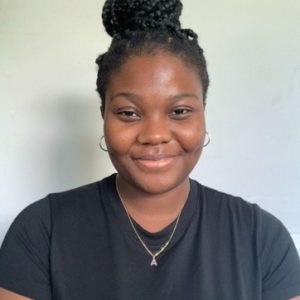In the eyes of Leslie T. Grover, Ph.D., writer and managing editor for PushBlack, a story is a part of who we are. “A story is a way of being in the world or acknowledging how someone else is or has been in the world,” she said.
We tell our stories daily, even when we don’t realize it. Stories are in every part of our lives, and they always will be — before we enter this world, while we’re here and after we’re gone. From internal dialogues to how we tell specific stories, Leslie believes that “there is nothing that exists about us or those around us that isn’t a story.”
Leslie is a passionate storyteller who has seen and embraced how stories affect people and brands as they work to make a positive impact. During her keynote session at Managing Editor LIVE, Leslie showed us why the stories we tell matter, how to use them to create change and why it’s important to see, hear and show Black stories.
Stories, Not Data, Change Minds
As a storyteller, Leslie understands that in content marketing, the stories you tell need to be backed by data. Data does its part in supporting your stories, but that isn’t what changes minds.
Leslie recalled a project where she was helping a community express its story through a public art installation. During a meeting to talk about the project, Leslie joined other community organizations to get feedback from the people who lived there. However, when a person outside of the community began to characterize the community based on data points (like crime, employment and education statistics), a woman who lived there set things straight.
She said: “Before you decide that you’re going to come into another person’s community and tell a story that you see from the outside, the first thing you need to ask is what is it that we like about this community?” The passion in the woman’s voice and speech as she defended her community and asked that others not judge based on outside data led Leslie to change her perspective.
“That story changed my life that day,” she said. “It taught me to ask, to start from an asset-based approach rather than deficiency.” The data only tells part of the story and in that moment, Leslie gained a new appreciation for the power of perspective, and the impact it has on the narratives we tell — and yes, even how we perceive data.
As content marketers, we need to understand our audience’s perspectives so that we can meet them where they are.
Act on the Stories You Know, Not What You Assume
That community meeting made Leslie aware of her responsibility as an outsider to truly reflect and distinguish the real story from what she assumed. Many of us have a preconceived story in our heads that’s either come from experience, media, friends or family.
Whether it’s about a certain group of people, a place or even a certain position in the workplace, people assume specific things about others even before any initial interactions. As a young professional, Leslie experienced these assumed stories more than once.
Her first job out of college was as a procurement officer for NASA, and in that role she experienced people making assumptions about her role and level of authority in the organization. In key moments, preconceived notions prevented Leslie’s colleagues from initially believing that a young, Black woman could hold such authority.
These stories aren’t going to go anywhere, but being aware of that is only part of evolving the narrative. “I don’t do that anymore. I don’t assume,” Leslie says. “I might have a story in my mind, but I’m not going to act on it.” The more aware we are of the stories we tell about others — our biases — the more power we have in destroying false narratives to get at the truth.
Honoring Black Culture through Storytelling
Black storytelling has had a unique impact on how many in the community tell stories. The Black community has always had an oral storytelling tradition even before we were able to write them down. These stories were developed in times of hardship and despair and were told in ways where words and movement became one.
“There are so many things that Black storytelling can do with just a few gestures and sounds that let you know exactly what’s going on,” Leslie said. From a simple tilt of the head, raise of an eyebrow or a subtle smack of the teeth, these small gestures add an element of distinction that many other stories can’t emulate and many people may not understand.
Leslie praises the recent Marvel film, Wakanda Forever, for capturing the gestures and sounds of the Black storytelling tradition. “Movies like that, particularly the Black Panther movie, serve to humanize Black people and the Black experience,” Leslie said
Stories like Black Panther and those produced on PushBlack are paving a way for change and creating a space for more Black storytellers. “It also strengthens the understanding of Black culture for Black people in a way that we necessarily don’t get, because all of us cannot trace our ancestral roots to exactly where we came from in Africa,” Leslie said.
At PushBlack, Leslie works to bring the Black experience to the forefront, not just for the community but for everyone externally to understand the history of the community, too. With each story, a person is able to dive deeper into the experience, into the stories, and see how knowing these stories changes the experience for everyone.
“Black history is so much more than enslavement, Martin Luther King Jr. and Rosa Parks,” Leslie said. “But it is stories that uplift Black people…[I]t’s those stories that absolutely can change the way that you are in the world and can change your existence, and can move you to action just by knowing stories.”
The more effective we can become as storytellers, the more power we can wield to demand positive change.






